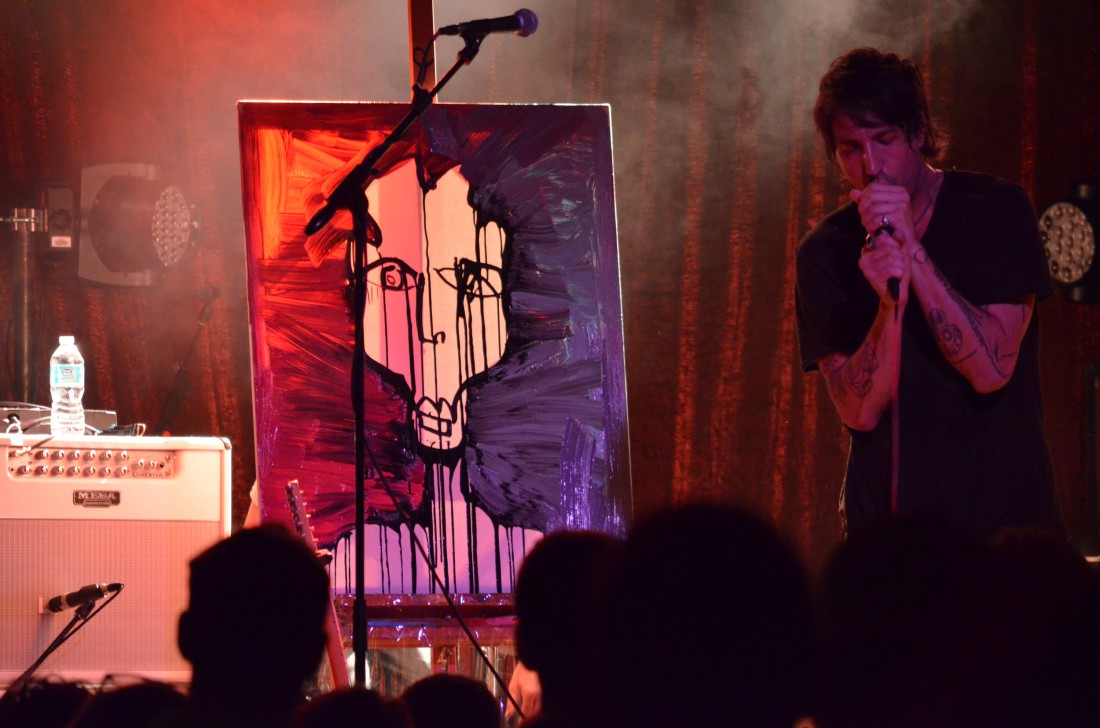It’s probably hard to open for The Afghan Whigs, one of the more formidable rock bands of the ’90s, with their huge sound and Greg Dulli’s powerful vocal — and even more challenging to open for the six-piece group as a solo artist. Unless you happen to be Joseph Arthur.
Of course, Arthur wasn’t exactly alone on The Orange Peel stage on Wednesday. He was surrounded by stacks of amps and his own array of equipment. Pedals, guitar, two mics, an easel and a Moog theremin (which he introduced with a wave of his hand, making the instrument warble and proving he’d stopped by the local factory).
Arthur started his set with “Still Life Honey Rose,” a moody and gently rhythmic song set to the musician’s own visual art projected on a pair of screens. He quickly picked up the energy with “The Ballad of Boogie Christ,” the title track of his 2013 release. Balanced between blasphemy and enlightenment, the song is soulful and rocking and offers a refreshing non-dogmatic worldview. Arthur can do that. From a lesser songwriter, the spiritual stuff would come off as agenda-driven; Arthur seems to use theological constructs as archetypal road markers on a path toward self-discovery and a greater openness to humankind. That, and the guy composes such lush instrumentation, layering guitar loops on stage and creating rhythms by beating on his guitar and stomping his feet, all enhanced by pedals.
Arthur introduced “I Used to Know How to Walk on Water,” a darkly gospel-tinged number, as “A song abut being disillusioned with yourself. See if you can relate.” Live, the musician’s songs differ to varying degrees from their album versions. Arthur seems less concerned with replicating his recordings and more in being attuned to the crowd and perhaps his own mood.
On “Even Tho,” (from 2004’s Our Shadows Will Remain), he crafted a beatbox-sounding base over which he unfurled, in stages, his falsetto and then a dusky modal register and finally an achingly ragged chest voice. That song morphed in Arthur’s spoken-world piece, “Travel As Equals” (the album version of — on Redemption City from 2012 — is both sung and spoken). “I Miss the Zoo,” another poem set to music, was performed while live-painting on stage, something the musician has incorporated into his performances for a few years. Because he uses loops, he can build a song and then hold a mic in one hand and a paint brush in the other. That intersection of music and visual art is remarkable to witness; so is the effortlessness with how Arthur manages so many moving parts in order to create a seamless one-man-band/immersive art experience. He ended the song with a theremin solo that sounded like saxophone marrying a piano in some futuristic world.
And that’s why Joseph Arthur — who’s been making records and touring for nearly 20 years — is one of most original and boundary-pushing artists in contemporary music. Follow him on pretty much any social media platform and prepare to be amazed by his creative output. It’s possible that he doesn’t sleep but, instead, channels his dreams into songs and paintings and the juxtaposition of the two. Arthur may not agree with this posit, but the overarching theme of his body of work is to bridge the sacred and the profane. He sees the golden in the mundane, the beauty in the tarnished. He nudges us toward a greater expression of our collective humanity (set to smart hooks and contagious melodies).





Outstanding article and so true as Mr. Arthur is a genius x ten thousand, what an honor to see him live! The audience was mesmerized by his presence and talent. He truly,represents the theory of multiple intelligence as portrayed visually, auditory, kinesthetically, and beyond